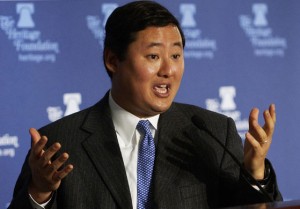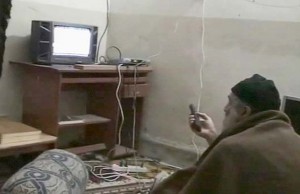John Yoo is someone who knows how to push an argument. At the U.S. Justice Department he designed rationales for the most controversial policies of the Bush-Cheney “war on terror,” and since then he has promoted right-wing political views in the opinion pages of the Wall Street Journal. Yoo must also know that an argument, however unyielding, quickly goes limp when it gets basic facts wrong.
If so, he hasn’t bothered to address a key problem with his recent Op-Ed trashing President Obama for the killing of Osama bin Laden. His misrepresentation of the CIA’s role, flagged in a MediaBugs error report, undermines Yoo’s most audacious critique of the president.
What was hailed across the press and party lines as Obama’s “gutsy” call to send in the Navy Seals, Yoo regarded as a botched opportunity. He suggested that the U.S. might have taken bin Laden alive. “If true, one of the most valuable intelligence opportunities since the beginning of the war has slipped through our hands,” Yoo wrote in the Journal.
That was just part of how he reiterated the case for the Bush administration’s brutal interrogations of terrorist suspects. Yoo further argued that Obama wanted bin Laden not dead or alive, but just dead — because taking him prisoner would have required Obama “to hold and interrogate bin Laden at Guantanamo Bay, something that has given this president allergic reactions bordering on a seizure.”
Here’s the problem: Yoo’s argument hangs on a faulty summation of the intelligence trail that brought the Navy Seals to Abbottabad. From Yoo’s perspective, as the U.S. closed in on the compound “the CIA became certain that the al Qaeda leader was hiding inside.”
That doesn’t square with planning and operational details made public by top Obama officials and the president himself. As many news outlets have reported, Obama had to calculate his risky decision based on uncertain evidence of bin Laden’s whereabouts. According to CIA director Leon Panetta, analysts were only 60 to 80 percent confident bin Laden would be found in the compound. “We never had direct evidence that he in fact had ever been there or was located there,” Panetta said. National Security Advisor Tom Donilon said Obama made his move based on “what was probably a 50-50 chance that Osama bin Laden was there.” The president himself said on “60 Minutes” that “there was no direct evidence” of bin Laden’s presence.
If Yoo and the editors of the Wall Street Journal know something about the bin Laden operation the rest of don’t, they should share it. Otherwise, they should correct the record.
In a recent conversation about news accuracy, a senior editor at the New York Times told me that its opinion writers tend to get more leeway than its news reporters do when it comes to drawing context. Still, he said that when an opinion writer has clearly gotten a fact wrong “you have to correct it.”
We agree. The question is, does the Wall Street Journal? We may not get an answer to that; thus far the Journal has been unresponsive to inquiries about Yoo’s piece, and its newsroom has proven inaccessible on such matters in prior cases.
It’s unsurprising to see Yoo argue for the notorious interrogation policies he helped craft. (Or for more credit for bin Laden’s demise to go to the president he worked for.) But his implication that Obama — armed with full-proof intelligence — intended from the get-go to bury bin Laden at sea just so he wouldn’t have to decide whether to waterboard him looks foolish in the face of widely reported facts. Meanwhile, the Times has since reported that the White House had two teams of specialists ready for action during the mission: “One to bury Bin Laden if he was killed, and a second composed of lawyers, interrogators and translators in case he was captured alive.”
As of this writing, MediaBugs’ multiple emails to Yoo and the Wall Street Journal have gotten no response and Yoo’s piece remains as it was first published.
Update, 5/23/11: There is now some additional reporting contradicting Yoo’s piece, from the Washington Post and… the Wall Street Journal itself. (See the updates at the bottom of the post.)


 Report an error
Report an error
> According to CIA director Leon Panetta, analysts were only 60 to 80 percent confident bin Laden would be found in the compound
If someone wants to interpret this to mean that the CIA was “certain”, I wouldn’t argue the point. Certainty is a fuzzy enough concept that it’s not worth arguing 20 imaginary per cent of certainty. (100% certainty could be reserved for God or Bin Laden himself.)
“If someone wants to interpret this to mean that the CIA was “certainâ€, I wouldn’t argue the point.”
Bullshit.
“Certainty is a fuzzy enough concept”
More bullshit. Certainty means being 100% sure.
This is only speculation, but my guess is that the SEALs’ directive was not to kill OBL in cold blood if he surrendered, but to make sure that, whatever else happened, he didn’t escape. So if, according to the official story, he turned and ran back into his room when he saw them, possibly to grab a weapon, the SEALs were taking no chances as long as they had a clean shot at him.
In that narrow sense, then, Yoo is correct that Obama didn’t see taking bin Laden alive as a top priority. And I will admit breathing a sigh of relief that we had avoided the political circus that would have resulted had we captured him. But especially given the evidence haul that we took from his compound (which Yoo curiously doesn’t mention), I have to say things worked out about as well as anyone could have hoped. Osama’s death is in itself an important symbolic victory (just as his escape would have been a disaster).
Also, as much as I hate the right-wing trope that criticizing the government is “maligning the troops”, I couldn’t help but notice that implicit in Yoo’s critique is a refusal to give any credit to the judgment of the SEALs. Unless I hear evidence to the contrary, I’m inclined to give them the benefit of the doubt that they took the appropriate action to a) achieve their strategic objective and b) minimize the potential for harm to themselves and any innocent people at the scene.
A Navy Seal does more badass shit everyday before John Yoo wakes up in the morning. Specifically, they are trained to make cold blooded decisions in chaotic environments. I’d like to see Yoo’s logic in the fires of Pakistan.